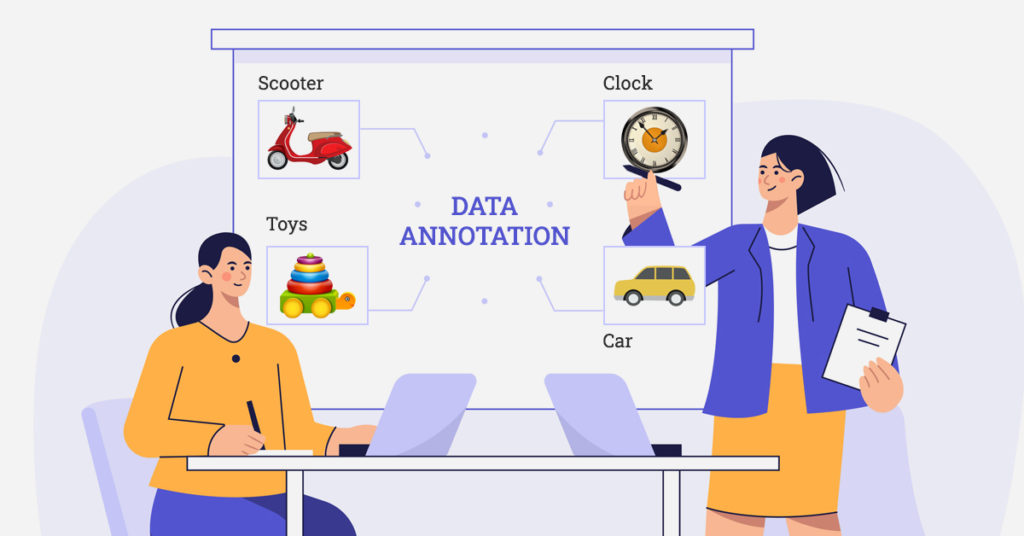
In the rapidly evolving field of artificial intelligence (AI), the success of machine learning projects is heavily dependent on the quality of data used for training. However, acquiring, cleaning, and managing this data, particularly through annotation, is a significant challenge. This article delves into the intricacies of data annotation, focusing on its cost, quality, and security. We will explore the problems associated with data annotation, their consequences, and solutions provided by leading platforms as well as learn more about a Vietnam’s product that also working on data annotation services.
Data annotation involves providing context and meaning to raw data, enabling machine learning models to recognize patterns, make predictions, and perform complex tasks (Joshi, 2021). It is the backbone of machine learning, turning unstructured data into valuable information that AI systems can process. This foundational step is crucial for training machine learning models, as it directly impacts their ability to learn from the data and deliver accurate, actionable insights. For example, annotated images allow computer vision systems to identify objects, while labeled text data helps natural language processing models understand language nuances and context.
Data annotation is crucial for ensuring the performance and reliability of machine learning models (AI, 2023). The success of these models heavily depends on high-quality, accurately labeled data. Without precise annotations, models cannot learn effectively, leading to poor performance and unreliable outcomes. For instance, in a facial recognition system, if the annotations are incorrect or inconsistent, the model may misidentify individuals, undermining its utility. Therefore, meticulous data annotation is not just a technical requirement but a fundamental component that ensures the integrity and success of machine learning applications across various domains.

Data annotation can be done either manually or automatically, each with its own set of advantages and challenges. Manual annotation, while often more accurate, requires significant effort and resources. This process involves human annotators meticulously reviewing and labeling data, which ensures a high level of precision and contextual understanding. However, manual annotation is inherently labor-intensive and costly, straining budgets, especially for large-scale projects involving vast amounts of data. The need for skilled annotators and the time-consuming nature of the process contribute to its high expense.
Additionally, according to Karatas (2021), maintaining data quality during manual annotation adds further complexity, as human error and inconsistencies can impact the overall reliability of the annotated data. Ensuring that the annotations are both accurate and consistent across different data sets and annotators becomes a challenging task, potentially affecting the performance of the resulting machine learning models.
In contrast, automatic annotation methods, such as those utilizing machine learning algorithms, offer the advantage of scalability and cost-effectiveness. These methods can process large volumes of data quickly and with less direct human intervention. However, the accuracy of automated annotation often depends on the quality of the algorithms and models used, which may not yet match the precision of manual annotation in complex or nuanced contexts.
Pricing for automatic annotation generally includes per-label or per-project fees and is often lower than manual annotation due to reduced labor costs. However, the accuracy of automated annotations relies heavily on the quality of the algorithms and models, which may not yet match the precision of manual methods in complex contexts.
The accuracy of annotation is crucial for AI and machine learning model performance. Human errors during annotation can degrade data quality, directly impacting predictive capabilities. Incorrect or inconsistent annotations lead to unreliable results, undermining model effectiveness. Gartner's study shows poor data quality costs companies about 15% of their revenue (Karatas, 2021), highlighting the need for high-quality annotations.
By ensuring accurate and consistent labeling, organizations can avoid costly mistakes and inefficiencies, enhancing AI/ML system reliability. Prioritizing accurate data annotation is essential for optimizing model performance and safeguarding against financial and operational setbacks associated with poor data quality.
Protecting sensitive data from breaches and unauthorized access is crucial, especially with personal or medical information. Data breaches can lead to legal issues and loss of customer trust, making robust security practices essential. Implementing encryption, secure storage, and strict access controls helps safeguard data during annotation. Regular security audits and compliance checks are also necessary to identify vulnerabilities.
The risk of breaches underscores the need for stringent security measures to protect data integrity and confidentiality, ensuring organizations avoid legal repercussions and maintain customer trust.

A hybrid approach, combining automated and manual annotation, efficiently handles large data volumes cost-effectively. Automated tools quickly process bulk data, leveraging algorithms to perform initial labeling at scale, speeding up the annotation process and reducing labor for extensive datasets. Human annotators focus on complex tasks requiring nuanced understanding and contextual interpretation, ensuring higher accuracy and quality. This balance between automation and human oversight reduces costs while maintaining high-quality annotations.
By utilizing both methods, organizations can optimize their data annotation processes, training models on accurately labeled data without incurring prohibitive expenses.
To optimize both cost and accuracy, a hybrid approach combining manual and automatic annotation methods is recommended. Automated tools can efficiently handle large volumes of data at lower costs, while manual annotation can address complex cases that require nuanced understanding. This strategy balances the scalability of automation with the precision of manual methods, ensuring high-quality annotations while managing costs effectively. Integrating automated pre-labeling with human review helps maintain data quality and reduces overall annotation expenses.
Implementing multi-step quality control processes is crucial for ensuring high-quality data annotations. These processes should include initial annotation, followed by review and re-annotation to catch and correct errors. Regular testing of data annotations for quality assurance purposes ensures that standards are consistently met and maintained over time. By combining AI pre-processing with human expert review, organizations can enhance both accuracy and reliability.
AI can handle the bulk of initial annotations quickly and cost-effectively, while human experts focus on reviewing and refining complex cases, providing nuanced understanding and contextual accuracy. This multi-step approach ensures robust quality control, optimizing the performance and reliability of AI and machine learning models.
Staying compliant with privacy and ethical regulations when annotating sensitive data is essential. Implementing encryption, secure access controls, and regular security audits protects data from breaches. Employee training on data security best practices further reduces the risk of unauthorized access, ensuring robust protection of sensitive information (Karatas, 2021).
Organizations can protect sensitive data during the annotating process by upholding strict security protocols and encouraging a culture of awareness and accountability among staff members. This all-encompassing strategy supports trust in the management of private or sensitive information while assisting in maintaining compliance and safeguarding data integrity.

A variety of platforms provide services for annotating data, with each one specifically addressing issues with cost, quality, and security. These platforms boost productivity, guarantee high-quality annotations, and safeguard sensitive data by fusing automation, human experience, and cutting-edge security measures.
Labelbox is renowned for its collaborative platform, which fosters seamless teamwork among annotators, leading to increased productivity and cost efficiency. The platform provides advanced features such as customizable quality review workflows, which ensure that annotations meet high standards. Labelbox also incorporates robust security protocols, including encryption and access controls, to protect sensitive data throughout the annotation process.
Its user-friendly interface and integration capabilities make it a popular choice for teams looking to streamline their data annotation efforts while maintaining rigorous quality and security standards (Encored Blog, 2024).
According to the reseach (Singh, 2024), Scale AI is a popular data annotation platform known for its auto-labeling capabilities and versatile tools, including image, text, and audio annotation. It offers flexible pricing and dedicated project managers to oversee data annotation projects.
Key features include automated quality control, where advanced algorithms ensure high-quality annotations by detecting and correcting errors. Its scalable infrastructure efficiently handles large-scale projects, making it ideal for enterprises. Additionally, Scale AI integrates seamlessly with existing machine learning workflows, providing APIs and tools to incorporate annotated data into model training and evaluation, thus enhancing the efficiency of the development cycle.
Appen offers a diverse range of annotation services with a particular focus on linguistic and textual data. The platform is designed to cater to various industry requirements, providing specialized annotation for text, language, and semantic understanding. Appen emphasizes the importance of high-quality linguistic annotations, leveraging a global crowd of skilled annotators to ensure accuracy and relevance.
The company also prioritizes strong security practices, including data encryption and secure data handling procedures, to protect client data throughout the annotation process. Appen's extensive experience and focus on linguistic data make it a valuable partner for projects requiring nuanced and accurate textual annotations (Encored Blog, 2024).
In Vietnam, AIScaler™ by VinBrain stands out as a premier solution for comprehensive data annotation services. This platform offers extensive labeling services for medical data, integrating training data, human resources, and processes into a robust collaborative environment to produce faster and better healthcare AI solutions.
By leveraging Vietnam's labor costs, which are 10% to 50% lower than those of neighboring countries, AIScaler™ can significantly reduce expenses. The labeling process involves three steps: data collection, cleaning and preparation, and labeling with AI-supported verification, enhancing labeling speed by 80% and efficiency of the whole process by 65%. The user-friendly interface ensures a quick and efficient labeling process.
AIScaler™ guarantees high-quality annotations thanks to its team with over ten years of experience in NLP and computer vision. The platform employs various quality control techniques to meet and exceed standards, and robust security protocols protect against attacks and unauthorized access to data.
By leveraging innovative technology and the expertise of its experienced team, AIScaler™ is a comprehensive solution that supports the efficient development of AI and machine learning models.
Data annotation presents several challenges, including high costs, extended timelines, quality concerns, and security risks. Addressing these issues requires a multi-faceted approach that incorporates cost-effective methods, stringent quality control, and robust security practices.
With the above solutions, AI developers are well-positioned to overcome previous challenges, leading to the creation of more advanced and useful AI products across various fields, from healthcare and finance to retail and transportation. This progress not only enhances the functionality and accuracy of AI applications but also drives innovation, ultimately benefiting users and businesses by delivering more practical and impactful technological solutions.
AI, T. (2023). What Is Data Annotation in Machine Learning? [online] Twine Blog. Available at: https://www.twine.net/blog/data-annotation-in-machine-learning/ [Accessed 17 Jul. 2024].
Blog, E. (2024). Top 10 Data Annotation and Data Labeling Companies [2024]. [online] encord.com. Available at: https://encord.com/blog/data-annotation-companies-for-computer-vision/ [Accessed 25 Jul. 2024].
Joshi, S. (2021). Why Data Annotation Is so Significant for Machine Learning & AI. [online] www.habiledata.com. Available at: https://www.habiledata.com/blog/why-data-annotation-is-important-for-machine-learning-ai/.
Karatas, G. (2021). Data Annotation: What It Is & Why Does It matter? [online] research.aimultiple.com. Available at: https://research.aimultiple.com/data-annotation/.
Singh, S. (2024). 10 Best Auto Annotation & Labeling Tools in [2024]. [online] Labellerr. Available at: https://www.labellerr.com/blog/best-data-annotation-platform-with-auto-labeling-feature/#2-scale-ai [Accessed 25 Jul. 2024].
Top